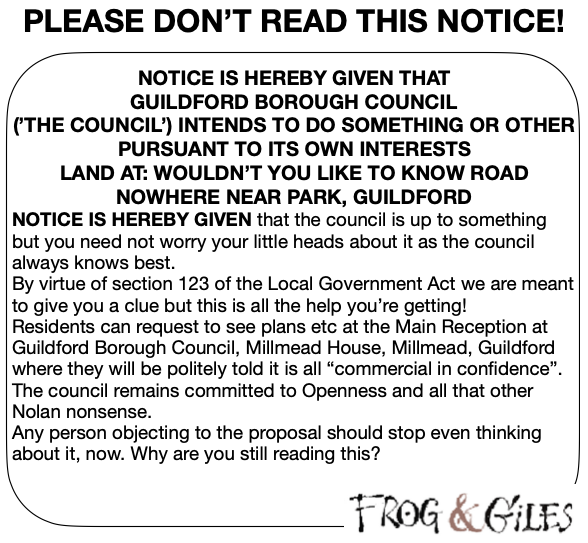 Abraham Lincoln
If given the truth, the people can be depended upon to meet any national crisis...
Abraham Lincoln
If given the truth, the people can be depended upon to meet any national crisis...
 Guildford news...
for Guildford people, brought to you by Guildford reporters - Guildford's own news service
Guildford news...
for Guildford people, brought to you by Guildford reporters - Guildford's own news service
Identity Theft – Who Is this Other Martin Giles?
Published on: 25 Feb, 2013
Updated on: 26 Feb, 2013
by Martin Giles
My identity has been stolen.
Someone pretending to be me, using my name, address and date of birth has apparently secured a pay advance which has not been repaid.
The first I knew was when a ‘FINAL NOTICE’ letter threatening all kinds of nasty things: a court judgement and court costs, bailiffs, or a salary deduction (if they can find a salary they are welcome to a reasonable percentage for their effort), arrived two days ago.
I rang the number on the letter.
“I have received this letter…” I started.
“What’s the reference?”
I read out the number.
“You need to pay…”
“No, it’s not me.”
“You are not Martin Giles?”
“Yes, I am Martin Giles.”
“And your address?”
I resisted the temptation to say, ‘Well the one you sent a letter to. How else would I have got it?’ and gave the first line of my address and post-code.
“Date of birth?”
I gave it.
“Your email address please?…. for confirmation.”
Paranoid now that I was giving my identity away to another person who I had no idea if I could trust I said, “Well it starts with mg.”
“That’s not the email address we have for you.”
(I kept the calm of the righteous.) “No because someone else has used my name.”
“Hmmm.” I sensed that the person I was talking to was frustrated that he could not go into his spiel about my need to cough up toute suite and was wondering whether my claim of innocence was true or just a denial tactic.
“So you have never worked at ……. Kitchens?”
“No, I have not even heard of them.”
“And you did not receive a salary advance from them?”
Biting my lip at the redundancy of the question I said: “No, I have had nothing to do with them. I did not even know they existed.”
I think he must have sensed my frustration which perhaps persuaded him that I was telling the truth. But he had a final ‘killer’ question, “What is you mobile number please?”
Sensing cooperation was probably best I gave it.
“That is not the number we have.”
 My self control was approaching Oscar award proportions: “Well I suppose that is because whoever used my name didn’t know it and did not want to risk you phoning me and discovering the fraud.”
My self control was approaching Oscar award proportions: “Well I suppose that is because whoever used my name didn’t know it and did not want to risk you phoning me and discovering the fraud.”
“Yes.” Game, set and match. He apologised for all the inconvenience, thanked me for calling and said I should ignore the letter (Oh really? Not send you some money then?) And, after prompting, that I should be advised of the outcome in due course.
As it happens, through previous jobs, I know quite a bit about identification. In this country it is all too easy to steal somebody else’s identity. There is a market for identity details gained through theft of passports, credit cards, driving licenses and so forth. My wallet was stolen in Italy some years back so it is possible that’s how my date of birth was known but anyway my passport has been photocopied in hotels and I have used my address online and in many other transactions, as one has to, many times, so it is hardly a secret.
Passports are regarded as one of the best means of identification, they probably still are, but in some countries genuine passports completed to order, can be obtained for a small bribe.
Even in the UK it was not that long ago that the passport agency admitted their estimate that 10,000 British passports were issued to individuals who were not entitled to them each year. Given their ten year validity that was 100,000 in circulation at any one time. On top of that there are forged (i.e. altered) passports and those which are counterfeit (those produced from scratch to appear genuine).
So, should we just live with the risk and hope it does not affect us too much? We might never know about identity theft until someone calls for a bad debt or, perhaps a loan is refused. Or should we expect more security? If so, what should that security be?
Nothing is 100% secure. Even the most tamper proof document relies on the security of the issue process, so one corrupt issuing officer would still be a problem. But our government was, in my view, very short-sighted to scrap plans for a biometric identity card, on which £millions had already been spent, when they came to power.
A convenient, credit card sized, more secure document would help, quite a bit, and it could offer all of us a lot of convenience, you would be able to travel throughout most of Europe on it, for instance. Also employers could request it when identifying job applicants, an important point of identification if one does not want unqualified people working in certain jobs, e.g. the NHS.
But even without an ID card or biometrics there are simple system improvements that could be made. A letter could be sent, as a matter of course when money is borrowed, or a job applied for, to the postal address given. This should help alert victims of some misuse, as it did in this case.
Identity theft is a nasty crime. There might not be any violence employed but when someone misuses your name they are not only stealing money or goods it feels as if they are attacking your character, reputation and honesty, perhaps your credit rating too. It is not something that should be taken lightly.
We all need to trust each other and our transaction systems, to a certain degree, or society would find it difficult to operate. It is time with the technology available today that the government, and others, did more about it.
Please note: if you have been subject to identity theft their is a website “Action Fraud” that you can register the offence with. It describes itself as ‘the UK’s national fraud and internet crime reporting centre’ and works with the police and Home Office.

See Dragon story: GBC’s Explanation of Major Land Sale Notice Error ‘Borders on Arrogant’ Says Councillor







Recent Articles
- Postal Vote Advice
- Hotel Granted Permission for 27-bedroom Extension
- Latest Figures Show Two in Every Three Burglaries Went Unattended in Surrey
- Dragon Interview: The Thriller Writer Who is a Climate Change Ambassador
- Notice: Guildford Twinning Association Filmfest 2024
- Zero Re-opens Uptown
- Letter: I Hope the New CEO Will Reflect on the Constructive Advice
- Campaign to Encourage Visitors to the Surrey Hills To Go by Train
- Police Commissioner Office Ordered to Remove Social Media Messages
- Police and Crime Commissioner Candidate Interview – Kate Chinn


Search in Site
Media Gallery
Dragon Interview: Local Artist Leaves Her Mark At One of England’s Most Historic Buildings
January 21, 2023 / No Comment / Read MoreDragon Interview: Lib Dem Planning Chair: ‘Current Policy Doesn’t Work for Local People’
January 19, 2023 / No Comment / Read MoreA3 Tunnel in Guildford ‘Necessary’ for New Homes, Says Guildford’s MP
January 10, 2023 / No Comment / Read More‘Madness’ for London Road Scheme to Go Ahead Against ‘Huge Opposition’, Says SCC Leader
January 6, 2023 / No Comment / Read MoreCouncillor’s Son Starts Campaign for More Consultation on North Street Plan
December 30, 2022 / No Comment / Read MoreCounty Council Climbs Down Over London Road Works – Further ‘Engagement’ Period Announced
December 14, 2022 / No Comment / Read MoreDragon Interview: GBC Reaction to the Government’s Expected Decision to Relax Housing Targets
December 7, 2022 / No Comment / Read MoreHow Can Our Town Centre Businesses Recover? Watch the Shop Front Debate
May 18, 2020 / No Comment / Read More







Recent Comments